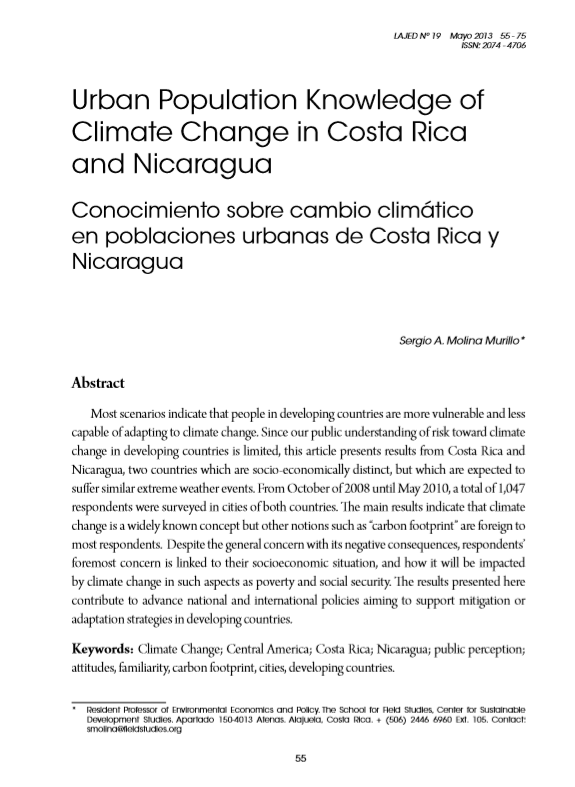Conocimiento sobre cambio climático en poblaciones urbanas de Costa Rica y Nicaragua
DOI:
https://doi.org/10.35319/lajed.201319108Palabras clave:
cambio climático, Centroamérica, Costa Rica, Nicaragua, percepción pública, actitudes, familiaridad, huella de carbono, ciudades, países en desarrolloResumen
La mayoría de los escenarios indican que las personas en los países en desarrollo son más vulnerables y menos capaces de adaptarse al cambio climático. Puesto que nuestra comprensión pública del riesgo frente al cambio climático en los países en desarrollo es limitada, en este artículo se presentan los resultados en Costa Rica y Nicaragua, dos países en los que se espera se produzcan fenómenos meteorológicos extremos, aunque países socio-económicamente distintos. Desde octubre del 2008 y hasta mayo del 2010, un total de 1.047 personas fueron entrevistadas en ciudades de ambos países. Los principales resultados indican que el cambio climático es un concepto ampliamente conocido, pero otras nociones tales como "huella de carbono" son ajenas a la mayoría. A pesar de la preocupación general por sus consecuencias negativas, la preocupación más importante de las personas está relacionada con su situación socioeconómica afectada por el cambio climático en aspectos tales como la pobreza y la seguridad social. Los resultados aquí presentados contribuyen a avanzar el desarrollo de políticas nacionales e internacionales destinadas a apoyar la mitigación y estrategias de adaptación en los países en desarrollo.
Descargas
Citas
Ajzen, I. (1991). The theory of planned behavior. Organizational Behavior and Human Decision Processes, 50,179-211.
Bandura, A. (1986). Social foundations of thought and action: a social cognitive theory. Englewood Cliffs, N.J., Prentice-Hall.
Bonniface, L. and Henley, N. (2008). A drop in the bucket: Collective efficacy perceptions and environmental behavior. Australian Journal of Social Issues, 43(3), 345-360.
Bord, R.J., O’Connor, R.E. and Fischer, A. (1998). Public Perceptions of Global Warming: United States and International Perspectives. Climate Research, 11, 75-84.
---------- (2000). In what sense does the public need to understand global climate change? Public Understanding of Science, 9(3), 205-218.
Bostrom, A., Granger, M., Fischhoff, B. and Read, D. (1994). What Do People Know About Climate Change? Risk Analysis, 14(6), 959-970.
Boza, M. (1993). Conservation in action: Past, present, and future of the national parks system in Costa Rica, Conservation Biology, 7(2), 239-47.
Browne, J. (2004). Beyond Kyoto. Foreign Affairs, 83(4), 20-32.
Charveriat, C. (2000). Natural Disasters in Latin America and the Caribbean: An Overview of Risk. Inter-American Development Bank working paper #434. Available at: http://www.iadb.org/res/publications/pubfiles/pubWP-434.pdf
ENCC. (2010). Costa Rica´s National Strategy on Climate Change Homepage. Available at: www.encc.go.cr.
EuropeAid. (2009). Climate change in Latin America. AGRIFOR Consult Group. http://ec.europa.eu/europeaid/where/latin-america/regional-cooperation/documents/climate_change_in_latin_america_en.pdf
Evans, S. (1999). The Green Republic: A Conservation History of Costa Rica. Austin, Texas: University of Texas Press.
Fournier-Origgi, L. (1991). Desarrollo y perspectivas del movimiento conservacionista costarricense. San Jose, Costa Rica. University of Costa Rica. 72 Urban Population Knowledge of Climate Change in Costa Rica and Nicaragua
Gifford, R. (2011). The dragons of inaction: Psychological barriers that limit climate change mitigation and adaptation. American Psychologist, 66(4), 290-302.
Gowdy, J.M. (2008). Behavioral economics and climate change policy. Journal of Economic Behavior and Organization, 68, 632-644.
Hahn, R.W. and Stavins R.N. (1991). Economic incentives for environmental protection: Integrating theory and practice. CSIA Discussion Paper 91-15.
Hardin, G. (1968). The tragedy of the commons. Science, 162(3859), 1243-1248.
Holl, K.D., Daily,G.D., and Ehrlich, P.R. 1995. Knowledge and perceptions in Costa Rica regarding environment, population, and biodiversity. Conservation Biology, 9(6), 1548-1558.
Intergovernmental Panel on Climate Change [IPCC] (2007). The Fourth Assessment Report (AR4): Climate Change 2007. www.ipcc.ch/ipccreports/assessmentsreports.htm.
Johnson, D. and Levin, S. (2009). The tragedy of cognition: psychological biases and environmental inaction. Current Science, 97(11), 1593-1603.
Jones, P.G. and Thornton, P.K. (2003). The potential impacts of climate change on maize production in Africa and Latin America in 2055. Global Environmental Change, 13(1), 51-59.
Kempton, W. (1991). Lay perspectives on global climate change. Global Environmental Change, 1(3), 183-208.
Leiserowitz, A. (2005). American risk perceptions: Is climate change dangerous? Risk Analysis, 25(6), 1433-1442.
---------- (2006). Climate change risk perception and policy preferences: The role of affect, imagery and values. Climatic Change, 77, 45-72
Leiserowitz, A., Smith, N. and Marlon, J.R. (2010). Americans’ Knowledge of climate change. Yale University. New Haven, CT: Yale Project on Climate Change Communication. http://environment.yale.edu/climate/files/ClimateChangeKnowledge2010.pdf
Lindenberg, S. and Steg, L. (2007). Normative, gain and hedonic goal frames guiding environmental behavior. Journal of Social Issues, 63(1), 117-137.
Maddison, D. (2007). The perception of and adaptation to climate change in Africa. World Bank Policy Research Working Paper, The World Bank.
Mitchell, T. D., and Hulme, M. (2000). A country-by-country analysis of past and future warming rates. Tyndall Centre for Climate Change Research. Working Paper No. 1. Norwich, U.K., Available at: http://www.cru.uea.ac.uk/~timm/papers/tyn-wp1.pdf
Myers, M. C. (2001). Economic development policy and the protected areas system in Costa Rica: A historical review and prospects for the future. Vida Silvestre Neotropical, 10(1-2), 3-19.
O’Connor, R. E., Bord, R. J., Fisher, A. (1999). Risk perceptions, general environmental beliefs, and willingness to address climate change. Risk Analysis, 19(3), 461-471.
Prochaska J.O., Velicer, W.F. (1997). The transtheoretical model of health behavior change. American Journal of Health Promotion, 12, 38-48.
Semenza, J.C., Hall, D.E., Wilson, D.J., Bontempo, B.D., Sailor, D.J. and George, L.A. (2008). Public perception of climate change: Voluntary mitigation and barriers to behavior change. American Journal of Preventive Medicine, 35(5), 479-487.
Stern, N. (2007). The Economics of Climate Change. New England Journal of Public Policy, 21(2), 23-50.
World Bank. (2009). World Development Report 2010: Development and Climate Change. Available at www.wb.org/wdr2010
World Health Organization [WHO] (2000). The World Health Report 2000 - Health systems: improving performance. Available at: http://www.who.int/whr/2000/en/index.htm





